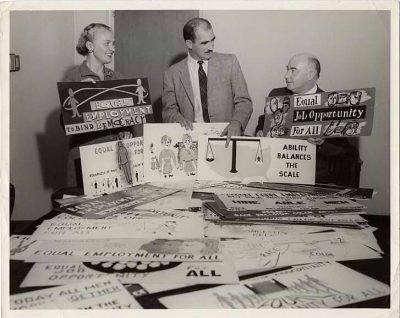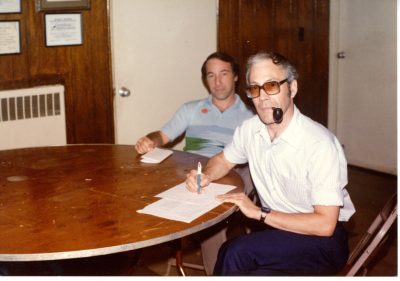Voter Education: Getting Involved

We’ve covered requesting an absentee ballot, how to educate yourself to prepare to vote, and even what to do at the polling place. But what if you want to be more involved in the political process, not just at the voting booth? Or maybe there’s a particular issue or law that you want people to pay attention to. Getting involved in local politics, through advocacy work, is an amazing way to amplify your voice and the needs of your community. And it’s easier than most people think!
Advocacy and lobbying can be done individually, as anyone can call their representatives, send letters and emails, and even appear in at meetings, such as town halls or legislative sessions. If you’re not sure where to start with your advocacy work, there are lots of groups that provide guidance and organization, based on who they represent, certain issues, or another unifying feature. You can start by connecting people from your synagogue or church, who may be working together to advocate for the local community. Or there may be specific issues that have brought people together, such as development over a particular part of your neighborhood. If you follow and support certain national organizations, like the ACLU, there are often local chapters that are doing lobbying work to ensure the rights of the people they protect. As you research these avenues, you may find an organization that fits closely with your beliefs and values. Finding a support network this way, as you embark into advocacy is incredibly helpful, as they have the resources and know-how to help you use your voice effectively.

Whether you have guidance from an organization or not, letting your local legislators know what is incredibly important. Local leaders especially are mindful of their constituents, as they know that their next election depends on the opinions of the people and can be determined by a very small margin. Keeping their constituents happy and secure in their choice of leader is a legislator’s responsibility, and so they want to hear what you need from them. This can be done in a few different ways.

You can always email your representatives directly. Their email addresses should be listed on your state’s government website. If you live in Maryland, you can find the State Senate emails here and the State House of Delegates’ emails here. You can also use that website to find the County Council from your area and their contact information. Emails are useful for people who are uncomfortable speaking on the phone or who cannot send physical letters to their representatives. However, sending an email is not as effective as these other methods, as it can easily be ignored, especially if the representative has a lot of emails in their inbox.
Calling a representative’s office is a really direct way to communicate what you want them to do. When making a phone call, try to connect to a person, rather than leaving a voicemail. Like an email, a voicemail is easier to ignore than a live person on the line. When reaching the office, ask for the representative, rather than speaking to an aide, so that they can hear from you directly. If that isn’t possible, make sure to speak to an aide who is working on the issues you’re concerned with. Making a phone call like this can daunting for some, but remember, taking these calls and considering your concerns is your representative’s job. This is what they were elected for, and they are obligated to listen to you.
If calling is not for you, but you still want to make an impact, handwriting a letter is another effective way to get your voice heard. When you write your letter, make sure to plan out time for it to get mailed to your representative, especially if you are addressing an upcoming vote. You can always drop the letter off directly (just make sure to check local guidelines on access to government buildings, especially during this time). A handwritten letter makes a statement of the time and effort you put into addressing the issue. It shows that you really care and will take the time to share your concerns.

A combination of those three methods is a great way to reach out to your local representative. When communicating in any way to local government, remember a few tips. Make sure to prepare your message before calling or sending it along. The action you want them to take should be clear, such as asking them not to vote on a bill, and you should add your personal connection to the issue. Let them know why it’s so important that they don’t vote on the bill. If you have trouble with creating a message, you can ask the local organization that you’re working with, as they’re sure to come up with a form letter that people can use and adapt to fit their personal story.
Also, remember to focus your messaging on your representatives. Your opinion won’t be as impactful to legislators outside your district or area, so it’s not worth putting your energy towards changing their actions. However, there are some exceptions to this, such as when there is a big, national law being voted on. Work with local and national organizations, to find out where you can make the most impact but stay focused on local issues.
To take it a step further, you can show up in person (or in a virtual meeting) to show legislators you care. Attending town halls and other similar meetings are a great way to find out more about a legislator’s plans for the upcoming political session and to ask them questions or to take action. When preparing to attend a town hall, work with the local organizing groups, so that you’re not going alone. A crowd of people, maybe all wearing the same color or the same shirt, asking about a particular issue will place a lot of pressure on a representative to listen to them. You should also prepare your questions ahead of time, again, making it clear what action you want the representative to take. Keep the questions short and clear, while still adding your personal spin. Keeping it personal will make the legislator see how important the issue is to you and that they need to consider your feelings.
There are lots of other ways to get more involved in politics, such as writing op-eds, attending protests, and donating money. Hopefully, this is just the start of your involvement in your community and the future you want to see!
